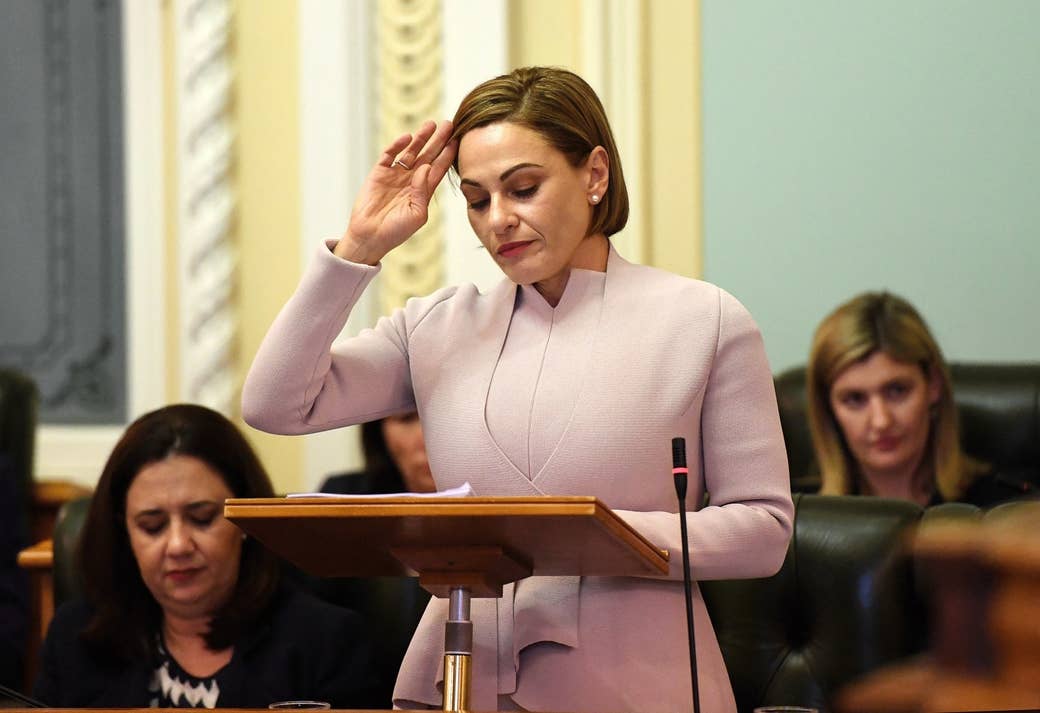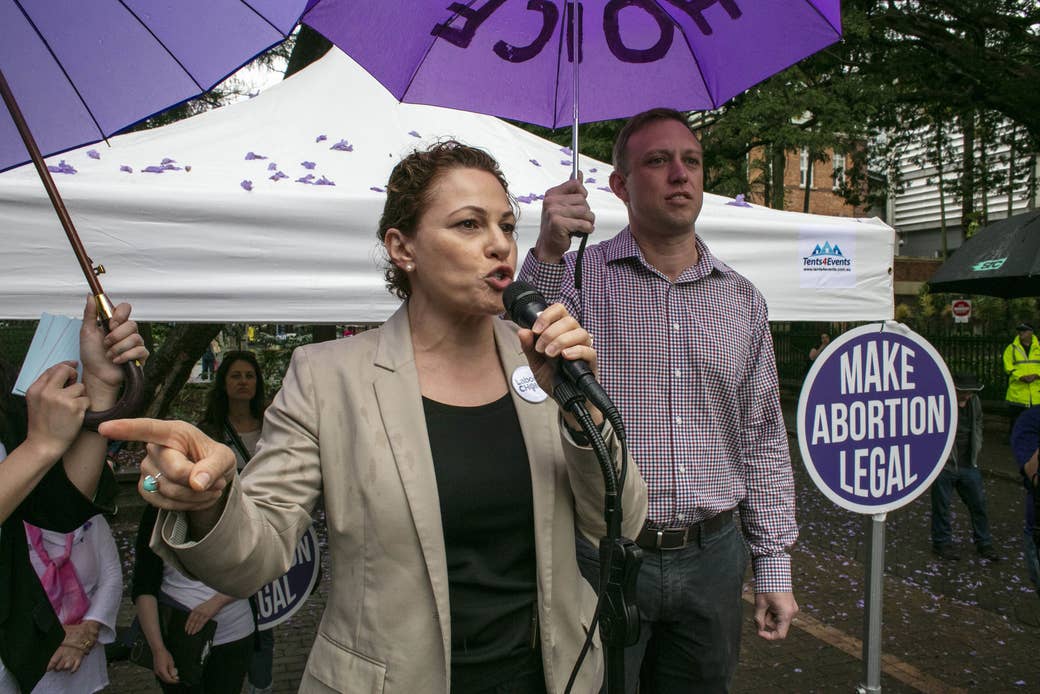
A few weeks before abortion was decriminalised in Queensland, Jackie Trad sat her electorate officers down and discussed whether she needed to hire security to protect them from protestors.
"I had prayer groups turning up to my electorate office, people coming in and hurling abuse," Queensland's deputy premier told BuzzFeed News the morning after legislation introduced by her government to decriminalise abortion passed through the state's parliament.
"My staff don’t deserve to come to work and be harassed and harangued and have offensive material thrust in their face or silicone foetuses, that is not their job."
Her staff closed the office early some days but told Trad they didn't need security.
"Like every other single woman who has been part of this debate or this side of the reform agenda, they just went 'we actually don’t want to inflame them any further, we just want to see these laws pass',' she says.
"What they were focused on, and I think what all MPs were focused on, was getting through this and getting the historical and phenomenal outcome of last night."
Trad championed the legislation, which will make abortion available up to 22 weeks gestation, after which two doctors need to approve the procedure.
But this advocacy came at a personal price.
Trad said she received abusive emails, letters and tweets for being pro-choice "every single day". Many of them called her the "minister for abortion". One of the fiercest opponents of decriminalising abortion, Liberal National Party MP Mark Robinson, named her "Jihad Jackie" in a tweet where he called Labor the "abortion party".
"I cannot recall in my entire time involved in Queensland politics where an individual MP has been vilified to the same extent over one bill," Trad says. "Never."
The "lowest point of the debate", she says, was when a pamphlet was distributed to all of her fellow parliamentarians a few weeks before the vote.
"A man who has been harassing women about their choice to have an abortion walked into parliament with handwritten envelopes with this pamphlet in it and the decision was made [by the parliament's speaker] to distribute it.
"It had the faces of a number of eminent historic figures, so Mahatma Gandhi, Shakespeare, feminist authors, and then at the bottom of the list was my photo with the text: 'What if all of these people’s mothers had decided to abort them?'."
Trad says this decision was inconsistent with her understanding of what was allowed in parliament.
"You can’t walk around this precinct with a slogan on your t-shirt because it might offend other people, but apparently an MP can be offended and bullied and harassed within this workplace because there is a view that MPs shouldn’t be impeded from accessing their mail ... This guy seriously stands with placards saying 'What if Jackie Trad’s mother had decided to have an abortion?'.
"This is a person who actually just wants to be offensive and zealous in his position and quite frankly we are not forcing him or anyone he knows to have an abortion, and we didn’t make abortion compulsory last night, we just decided that it should no longer be a crime."
The parliament's speaker, Curtis Pitt, told the parliament he deliberated over the decision to allow this flyer to be distributed to MPs.
"Whilst I certainly do not share the views and arguments made in the letter or the manner in which it was presented, I did not consider the material to be threatening, intimidating or grossly graphic," Pitt said before apologising to MPs who were distressed by the letters.
He then took the issue to the state's Committee of the Legislative Assembly to determine a clearer policy on distributing such material.

Trad says she has been inundated with messages of support and gratitude since the bill passed.
"I got a text message from a dear, dear friend of mine who I went to high school with," she says. "She had to have a late-term abortion when she found out at her morphology scan that her baby would be born with most of its skull and brain absent."
The friend thanked Trad on behalf of many of their school friends who had to "cross the border" to get an abortion decades ago.
"Now that is not going to happen for young women in Queensland ever again."
Queensland's Labor government is led by two women, Trad and premier Annastacia Palaszczuk, and has a far higher female representation than the other parties. The success of this legislation showed "we need more women in parliament", Trad said.
While 93% of male Liberal National Party members voted against decriminalising abortion last week, only one female LNP member, Jann Stuckey, voted for the bill.
"Those figures show we need more progressive women in parliament, because having a woman leader or a woman parliamentarian who doesn’t believe a woman’s right to control her own fertility is an issue, or should exist within a criminal code, isn’t really there to advance the interests of women," she said.
Just did a super quick gender breakdown of the final vote. Interesting to note 80% of female parliamentarians voted to decriminalise and that 93% of men in the LNP voted for abortion to remain a crime #qldpol https://t.co/qXfRaESoCL
"We need more women ... who are prepared to stand up for the things that will absolutely make a difference in the everyday lived experiences of women."
The two LNP men who voted for the bill were Steve Minnikin and former party leader Tim Nicholls.
"I thought it took a lot of courage for those three LNP MPs to come and vote with the government on this historic reform," Trad says.
The speech during the debate made by Minnikin, who became the first LNP politican to break ranks and throw support behind the bill, was a "standout", Trad says.
"Why do we make it a criminal act for women and girls who do not wish to have a pregnancy or a child at a particular time in their life? Why is forced pregnancy seen as a socially and legally acceptable solution to an unplanned conception? Why in 2018 do we not give women the respect to make their own reproductive choices and decisions about their own body, health and future?" Minnikin asked the parliament.
Trad said she was incredibly "disappointed" in politicians who stood up in parliament during the debate and said they agreed with decriminalisation, but not with the proposed legislation.
"This was a bill drafted by the independent Queensland Law Reform Commission, so that was really disappointing," Trad said, singling out the LNP's Sam O'Connor, who was on the record as pro-choice but who voted against the bill.
"Quite frankly this wasn't an ideological bill and those that say it was don't have any facts or any reasoned arguments," she said. "They just don’t believe a woman should have the right to choose, it's pure and simple."
